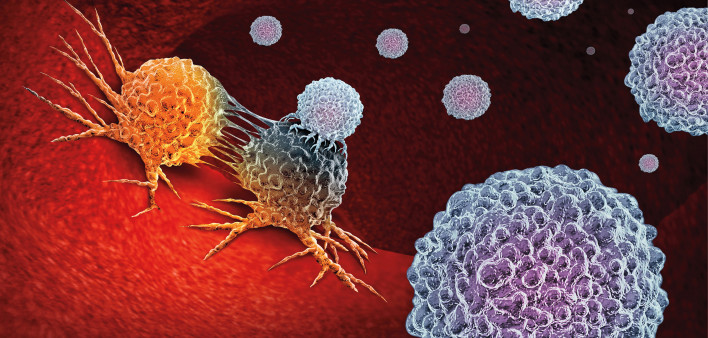Immunotherapy: Study Identifies PCBP1 An Intracellular Immune Checkpoint For Shaping T Cell Responses In Cancer Immunity
Source: Immunotherapy Jun 02, 2020 5 years, 4 months, 1 week, 5 days, 17 minutes ago
Immunotherapy: A research led by medical scientists from the Ohio State University Comprehensive Cancer Center has identified a protein called PCBP1 within certain immune cells that is required for optimal immune responses to cancer.

The study findings, reported in the journal
Science Advances, also suggest that the protein might be useful for predicting which cancer patients are less likely to respond to the form of therapy called immune checkpoint blockade.
https://advances.sciencemag.org/content/6/22/eaaz3865
The identified protein is called PCBP1, or poly(C)-binding protein 1. The study team found that PCBP1 helps shape immune responses by ensuring that adequate numbers of activated immune T cells differentiate into cytotoxic T cells, which kill cancer cells. At the same time, PCBP1 prevents the development of too many regulatory T cells, which do not kill cancer cells.
Dr Zihai Li, MD, Ph.D., a Professor in the Division of Medical Oncology at Ohio State and director of the Pelotonia Institute for Immuno-Oncology and lead researchers told Thailand Medical News, "Our research results suggest that PCBP1 is a global intracellular immune checkpoint, and that targeting it would offer a way to influence antitumor responses during immune therapy,"
Dr Ephraim Abrokwa Ansa-Addo,first author and an assistant Professor in the Division of Medical Oncology and also a member of the Translational Therapeutics Research Program said, "Immune checkpoint blockade therapy has revolutionized cancer treatment, especially in melanoma, non-small cell lung, and head and neck cancer. But we need better ways to identify which patients will benefit from the therapy. PCBP1 may help us do that."
The protein PCBP1 belongs to a family of molecules called RNA binding protein. It controls gene expression when immune T cells differentiate into either regulatory T cells or into cytotoxic T cells, which carry out immune responses against infection and cancer. (Cytotoxic T cells are a type of effector T cell.)
In activated T cells, PCBP1 prevents cytotoxic T cells from converting to regulatory T cells, thereby promoting immune responses against tumors.
For the research, the team used cell lines, tumor models, animal models, and models of diabetes and graft-vs-host disease to achieve a better understanding of the role of PCBP1 in T cells. Graft-vs-host disease is a condition in which a donor's T-cells (graft) view the patient's health cells (host) as a foreign and then attack and damage those normal cells.
Main findings from the study include:
-It was observed that In a non-cancer setting, higher PCBP1 activity promotes cytotoxic T-cell functions that inhibit tumor development and progression.
-However, in a cancer setting such as the tumor microenvironment, higher PCBP1 activity prevents cytotoxic T cells from expressing factors such as PD-1, TIGIT and VISTA, which produce conditions less favorable to immune checkpoint blockade therapy.
-Also in a cancer setting, lower PCBP1 in cytotoxic T cells triggers expression of PD-1 and other factors that suppre
ss the T cells' cancer immune responses, producing conditions more favorable to immune checkpoint blockade therapy.
Dr Li concluded, ”on the whole, our findings indicate that PCBP1 shapes tolerance and immunity by distinctively regulating cytotoxic T-cell versus regulatory T-cell differentiation, and that it could be a marker for response to immune checkpoint blockade therapy.”
For more on
Immunotherapy, keep logging to Thailand Medical News
